
The Dutch Language Union is an international regulatory institution that governs issues regarding the Dutch language. It is best known for its spelling reforms which are promulgated by member states, grammar books, the Green Booklet and its support of Dutch language courses and studies worldwide. It was founded on a treaty concluded between the Netherlands and Belgium on 9 September 1980. Suriname has been an associate member of the Taalunie since 2004.

The Flemish Movement is an umbrella term which encompasses various political groups in the Belgian region of Flanders and, less commonly, in French Flanders. Ideologically, it encompasses groups which have sought to promote Flemish culture and the Dutch language as well as those seeking greater political autonomy for Flanders within Belgium. It also encompassed nationalists who seek the secession of Flanders from Belgium, either through outright independence or unification with the Netherlands.
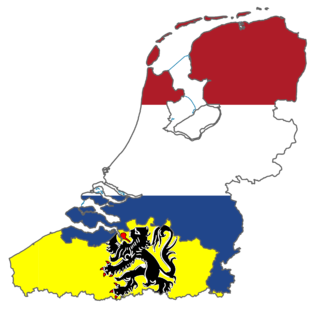
Greater Netherlands is an irredentist concept which unites the Netherlands, Flanders, and sometimes Brussels. Additionally, a Greater Netherlands state may include the annexation of the French Westhoek, Suriname, formerly Dutch-speaking areas of Germany and France, or even the ethnically Dutch and/or Afrikaans-speaking parts of South Africa, though such variants are mostly limited to far-right groups. A related proposal is the Pan-Netherlands concept, which includes Wallonia and potentially also Luxembourg.

Leopold Maximiliaan Felix Timmermans is a much translated author from Flanders. He was nominated for the Nobel Prize in Literature three times.

The Flemish Diamond is the Flemish reference to a network of four metropolitan areas in Belgium, three of which are in the central provinces of Flanders, together with the Brussels Capital Region. It consists of four agglomerations which form the four corners of an abstract diamond shape: Brussels, Ghent, Antwerp and Leuven. Over 5 million people live in this area, with a population density of about 820 per km2.
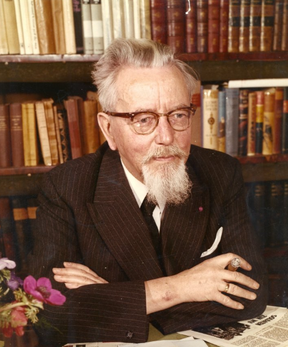
Andreas Ernestus Josephus Claes was a Belgian author. He is best known for his regional novels, including De Witte ("Whitey"), which was the source material for the first Flemish movie: De Witte (1920). In 1980 it was remade as De Witte van Sichem by Robbe De Hert.
Karim Van Overmeire is a Flemish politician, author, city planner and member of the New Flemish Alliance party.
TeKoS is a Flemish "Nieuw Rechts" publication. It is published by Knooppunt Delta.

Gorki was a Belgian rock group, in its most recent line-up consisting of Luc De Vos, Luc Heyvaerts, Erik Van Biesen, Thomas Vanelslander (guitarist) and Bert Huysentruyt (drums). Three songs by Gorki were number one hits in the Studio Brussel alternative hitlist De Afrekening in Belgium: 'Lieve kleine piranha', 'Schaduw in de schemering and 'Joerie' in 2006. Luc De Vos died on 29 November 2014.
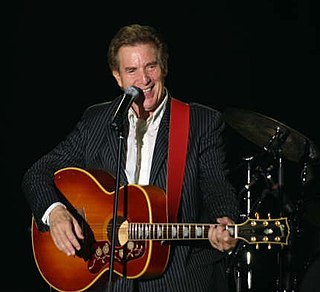
Arthur Achiel Albert, Knight Blanckaert, known by his stage name Will Tura, is a Belgian artist considered as the most successful Flemish-speaking singer of the 20th century. Famous in Flanders and the Netherlands, Tura is a singer, musician, composer and songwriter. Nicknamed the Emperor of the Flemish Song, he released hundreds of singles and albums that cover a wide array of styles, and continued to tour into the 2010s.

Karel Jonckheere as Carolus Joannes Baptista Jonckheere was a Flemish writer and critic. Widely traveled, he was inspired by his journeys for his poems and novels.

Scouts en Gidsen Vlaanderen is a coeducational, Flemish Scout and Guide organisation in Belgium and is a member of the Guidisme et Scoutisme en Belgique/Gidsen- en Scoutsbeweging in België.

Paul de Wispelaere was a Flemish writer.
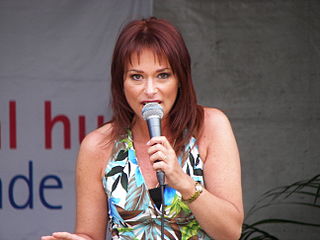
Lisa del Bo is a Belgian singer who is popular in her own country and also in Germany. Lisa del Bo is a Flemish singer who often sings in the Dutch language but has been known to record songs in other languages as well.
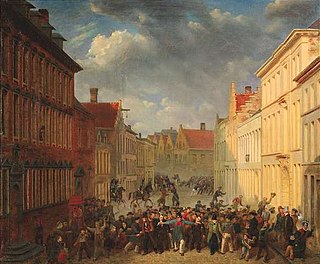
Orangism was a political tradition in Belgium that supported its reintegration into the short-lived United Kingdom of the Netherlands (1815–1830) under the rule of the Dutch House of Orange. It existed principally in the 1830s and 1840s.

De Kreuners are a Flemish rock band established in 1978. They first received interest when they won the first Humo's Rock Rally in 1978, but didn't get a record contract. They self released their first three singles. They recorded their first single Nummer een in London. It became their first success. After these three singles, they signed with Warner Bros. and released in 1981 's Nachts kouder dan buiten. It sold 30,000 copies. By the time of their second album, 1982's Er sterft een beer in de taiga, they were one of Flanders' most successful bands, and the record became gold in two days time. In 1990 they switched to EMI and released their biggest success, the 1990 album Hier en nu, which sold 100,000 copies. The single Ik Wil Je has sold over 1 million copies. Their best of Het beste van de Kreuners is already certified platina before its release date.

Ernest Van der Hallen was a Flemish writer and Catholic youth leader during the Interbellum. Van der Hallen was an inspirational figure for the Flemish nationalist youth movement.

Flemish (Vlaams) is a Low Franconian dialect cluster of the Dutch language. It is sometimes referred to as Flemish Dutch, Belgian Dutch, or Southern Dutch. Flemish is native to the region known as Flanders in northern Belgium; it is spoken by Flemings, the dominant ethnic group of the region. Outside of Belgium Flanders, it is also spoken to some extent in French Flanders and the Dutch Zeelandic Flanders.
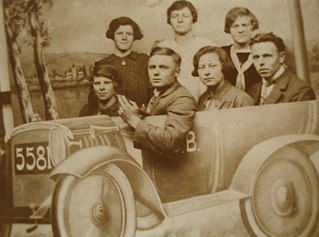
André Demedts was a Belgian Flemish writer and teacher. He has published works in many genres, all in Dutch. In 1962 he received the Prijs voor Letterkunde van de Vlaamse Provincies for his work De levenden en de doden. In 1976 he received the award in honour of his life-time career. In 1990 he has received the Award "Driejaarlijkse Staatsprijs voor literatuur" to honour his career as a writer. In 1970 the award André Demedtsprijs was established to reward persons engaged in the cause of the large Dutch/Flemish cultural development with a main purpose to integrate and entangle cultural activities in the Netherlands, Flanders and South Africa.

Pan-Netherlands, sometimes translated as Whole-Netherlands, is an irredentist concept which aims to unite the Low Countries into a single state. It is an example of Pan-Nationalism.

















